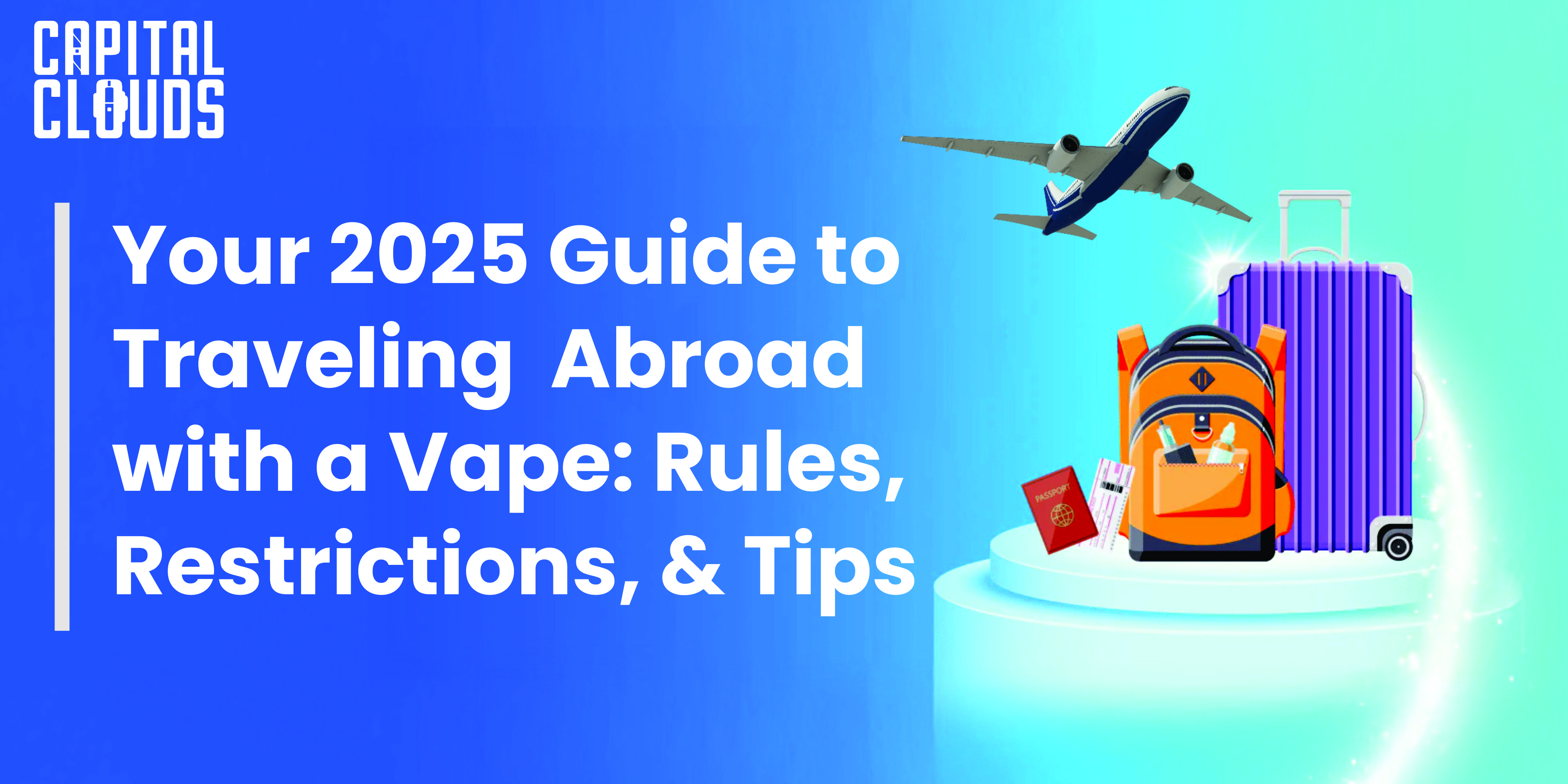Your 2025 Guide to Traveling Abroad with a Vape: Rules, Restrictions, and Tips

Traveling abroad in 2025, whether for a quick getaway or a business trip, requires careful planning if you intend to bring your vape. Vaping laws vary significantly across countries, airlines, and even specific regions, so understanding the rules is crucial to avoid issues like confiscation, fines, or travel disruptions. This blog post provides a comprehensive guide to traveling with your vape, covering how to pack your device and e-liquids, airline regulations, and the global landscape of vaping restrictions.


Always conduct thorough research before your trip, as this guide is informational and regulations can change rapidly.
In This Blog
- Packing Your Vape: Where to Store Devices and Accessories
- Guidelines for Vape Kits, Pods, and E-Liquids
- Air Travel Rules for Vaping
- Vaping at Airports
- Onboard Vaping Restrictions
- International Vaping Laws
Packing Your Vape: Where to Store Devices and Accessories
When preparing for air travel, you must pack your vape and its components correctly to comply with airline safety rules. Vapes, including batteries and devices, must be carried in your hand luggage, not checked baggage. Stowing them in the hold poses a fire risk if the battery is damaged or the device activates unintentionally. Non-compliant luggage may be removed, causing delays or even preventing you from boarding.
Vape Kit Packing Guidelines
- Rechargeable Vapes: Most airlines, like easyJet, allow one vape device and up to two spare batteries in carry-on luggage. Devices must be powered off, and charging or using them onboard is prohibited. Tanks or pods must be empty, with any e-liquid stored separately in compliance with liquid restrictions. Spare tanks or pods should also be disconnected from the battery.
- Disposable Vapes: As of June 1, 2025, disposable vapes are banned in the UK, making them obsolete for travel. Previously, their sealed nature exempted them from some rules, but this no longer applies.
Vape Pod Packing Guidelines
Prefilled pods must be treated as liquids and stored in your carry-on’s clear plastic bag, adhering to the 100ml liquid limit. Ensure you don’t exceed this limit when packing multiple pods.
Vape Juice Packing Guidelines
E-liquids in carry-on luggage are restricted to 100ml per container, placed in a single clear plastic bag with other toiletries. Some airports, like Gatwick, no longer require plastic bags for liquids, but you must still comply with the 100ml rule. For checked luggage, there’s no volume limit for e-liquids, but secure bottles tightly and wrap them in plastic to prevent leaks. Empty pods or tanks are recommended to avoid issues from cabin pressure changes.
Recommended Vape for Travel
Prefilled pod kits, especially larger-capacity “big puff” models, are ideal for travel. They’re user-friendly, available in various flavors, and often feature a modular design (e.g., 2ml pod + 10ml liquid) that simplifies compliance with airline rules. You can separate components during travel and reassemble them upon arrival for immediate use.
Vaping at Airports
Vaping rules at airports depend on local laws. In countries where vaping is legal, it’s typically treated like smoking, meaning it’s prohibited inside terminals, at gates, and often in car parks or drop-off zones. Use designated smoking/vaping areas outside the terminal to stay compliant.
Onboard the Plane: Vaping Dos and Don’ts
- Storage: Keep e-liquids in a plastic bag and store batteries in your carry-on. Empty tanks or pods to prevent leaks due to cabin pressure.
- No Vaping Allowed: Vaping on planes is strictly prohibited. Aircraft have sensitive vapor detectors, and triggering them can lead to investigations. Penalties vary by country and airline:
- UK: Fines up to £5,000, possible airline bans, or criminal charges.
- USA: Fines between $2,000 and $4,000.
- Vaping onboard is not only illegal but also disruptive to passengers and crew. Consider nicotine alternatives like patches, gums, or pouches, which are permitted onboard but must be checked for legality at your destination.
International Vaping Laws in 2025
Vaping regulations differ widely across the globe, ranging from permissive to outright bans with severe penalties. Below is a summary of key restrictions based on available data.


Countries Where Vaping Is Illegal
The following countries have comprehensive bans on vaping, including possession, use, sale, and import:
- Argentina: Long-standing ban on all vape-related activities; usage is socially stigmatized.
- Brunei: Illegal to import or sell; vaping is effectively banned as smoking laws apply.
- Cambodia: Illegal, with police confiscating devices, though arrests are rare.
- Laos: Complete ban with fines and potential imprisonment.
- Qatar: Illegal, with fines up to £2,200, three months in jail, or deportation.
- Singapore: Fines up to $2,000 per offense for possession or use.
- Thailand: Strictest anti-vape laws, with up to five years in prison, fines of ~$1,000, or deportation.
- Oman: Appears fully illegal.
- Venezuela: Fully illegal, though enforcement details are unclear.
- Hong Kong: Import, sale, and manufacture banned; possession ban planned for 2026.
- Macau: Fines of ~£400 for users and distributors.
- Gambia: All vape products illegal.
- Mexico: Import and sale banned; possession rules unclear.
- Taiwan: Fines of $66–$330 for vaping.
- India: Nationwide ban, though vapes remain widely available.
- Vietnam: Fully illegal as of 2025.
Countries with Vaping Restrictions
These countries restrict vape sales or imports but may allow personal use, with varying rules:
- Australia
- Brazil
- Cabo Verde
- Ethiopia
- Iran
- Iraq
- Kazakhstan
- Lebanon
- Mauritius
- Norway
- Panama
- Sri Lanka
- Suriname
- Syria
- Timor-Leste
- Turkey
- Turkmenistan
- Uganda
- Uruguay
Vaping in Australia
Australia has stringent vaping laws:
- Vapes with ≤20mg nicotine are available only at pharmacies for those over 18, intended for smoking cessation.
- Stronger vapes or use by those under 18 requires a prescription.
- Public vaping follows smoking laws, varying by state.
- Traveler’s Exemption (from March 1, 2024): Travelers need a prescription and are limited to 2 vapes, 20 accessories (e.g., pods), and 200ml of e-liquid for personal or caregiving use.
Countries Banning Public Vaping
Public vaping is prohibited in:
- Barbados
- Bermuda
- Cambodia
- Costa Rica
- Guyana
- Iran
- Jamaica
- Mauritius
- Mexico
- Moldova
- Netherlands
- Panama
- Paraguay
- Russia
- Sierra Leone
- Syria
- Uruguay
Always check local regulations and UK Government Travel Advice before traveling to these countries.
Tips for Vaping Abroad in 2025
While the UK enjoys relatively relaxed vaping laws, many countries impose strict rules or cultural disapproval. To travel safely:
- Research Thoroughly: Verify destination laws, as regulations evolve quickly (e.g., UK’s disposable vape ban).
- Vape Discreetly: Even in vape-legal countries, avoid public use to respect local customs.
- Buy from Reputable Sources: If purchasing vapes abroad, choose trusted vendors to avoid counterfeit products.
- Use Nicotine Alternatives: For long flights or restrictive destinations, consider patches, gums, or pouches, but confirm their legality.
Note: This guide is for information purposes only; we highly recommend that you conduct your own checks with local tourist information services before you depart, as regulations around vaping are changing every day.
 Help Center
Help Center




